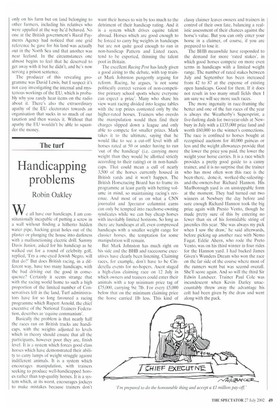Handicapping problems
Robin Oakley
We all have our handicaps. I am constitutionally incapable of putting a screw in a wall without finding a hitherto hidden water pipe, hacking great holes out of the plaster or plunging the house into darkness with a malfunctioning electric drill. Sammy Davis Junior, asked for his handicap as he walked out for a round of celebrity golf, replied, 'I'm a one-eyed Jewish Negro, will that do?' But does British racing, in a different way, have too many handicaps, with the had driving out the good in consequence? Certainly it seems strange that with the racing world home to such a high proportion of the limited number of Conservatives left in the land, Turf administrators have for so long favoured a racing programme which Rupert Arnold, the chief executive of the National Trainers Federation, describes as 'equine communism'.
Basically the problem is that nearly half the races run on British tracks are handicaps, with the weights adjusted to levels which in theory should ensure that all the participants, however poor they are, finish level. It is a system which forces good class horses which have demonstrated their ability to cam/ lumps of weight struggle against indifferent animals. It is a system which encourages manipulation, with trainers seeking to produce well-handicapped horses rather than top-quality horses. It is a system which, at its worst, encourages jockeys to make mistakes because trainers don't want their horses to win by too much to the detriment of their handicap rating. And it is a system which drives equine talent abroad. Horses which are good enough to be forced to carry big weights in handicaps but are not quite good enough to run in non-handicap Pattern and Listed races, tend to be exported, thinning the talent pool in Britain.
The excellent Racing Post has lately given a good airing to the debate, with top trainer Mark Johnston pungently arguing for reform. Racing, he argues, 'is not some politically correct version of non-competitive primary school sports where everyone can expect a prize'. Many who share his view want racing divided into league tables with the top prizes contested only by the higher-rated horses. Trainers who overdo the manipulation would then find their charges slipped down a league and only able to compete for smaller prizes. Mark takes it to the ultimate, saying that he would like to see a cut-off level with all horses rated at 50 or under having to run 'out of the handicap' (i.e. carrying more weight than they would be allotted strictly according to their rating) or in non-handicaps. That could mean a cull of nearly 3,500 of the horses currently housed in British yards and it won't happen. The British Horseracing Board has to frame its programme at least partly with betting volume in mind, so maintaining racing's revenue. And most of us on what a CNN journalist and Spectator columnist earns can only be tempted into racehorse-owning syndicates while we can buy cheap horses with inevitably limited horizons. So long as there are handicaps at all, even compressed handicaps with a smaller weight range for classier horses, the temptation for some manipulation will remain.
But Mark Johnston has much right on his side and the BHB and racecourse executives have clearly been listening. Claiming races, for example, don't have to be Cinderella events for no-hopers. Ascot staged a high-class claiming race on 12 July in which owners and trainers could enter their animals with a top minimum price tag of £75,000, carrying 9st 71b. For every £5,000 below that on the minimum claiming price the horse carried ilb less. This kind of classy claimer leaves owners and trainers in control of their own fate, balancing a realistic assessment of their chances against the horse's value. But you can only enter your horse in a claimer, of course, if you are prepared to lose it.
The BHB meanwhile have responded to the demand for more 'rated stakes', in which good horses compete on more even terms in handicaps with a limited weight range. The number of rated stakes between July and September has been increased from 42 to 87 at the expense of existing open handicaps. Good for them. If it does not result in too many small fields then I am sure we will see more such races.
The more ingenuity in race-framing the better and one of the fun races of the year is always the Weatherby's Supersprint, five-furlong dash for two-year-olds at Newbury in July with a £135,000 prize fund and worth £60,000 to the winner's connections. The race is confined to horses bought at recognised auctions for 40,000 guineas or less and the weight allowances provide that the lower the price you paid, the lower the weight your horse carries. It is a race which provides a pretty good guide to a canny trainer, and it is no surprise that the trainer who has most often won this race is the been-there, done-it, worked-the-salesringand-the-owners-bar Richard Hannon. His Marlborough yard is on unstoppable form at the moment. They had turned out two winners at Newbury the day before and sure enough Richard Hannon took the big prize again with Presto Vento, though he made pretty sure of this by entering no fewer than six of his formidable string of juveniles this year. 'She was always my pick when I saw the draw,' he said afterwards, before picking up another race with Nemo Fugal. Eddie Ahern, who rode the Preto Vento, was on his third winner in four rides for the Hannon yard. I had backed James Given's Wunders Dream who won the race on the far side of the course where most of the runners went but was second overall. She'll score again. And so will the third Sir Edwin Landseer. Trainer Paul Cole was incandescent when Kevin barley unaccountably threw away the advantage his colt had been given by the draw and went along with the pack.
































































 Previous page
Previous page